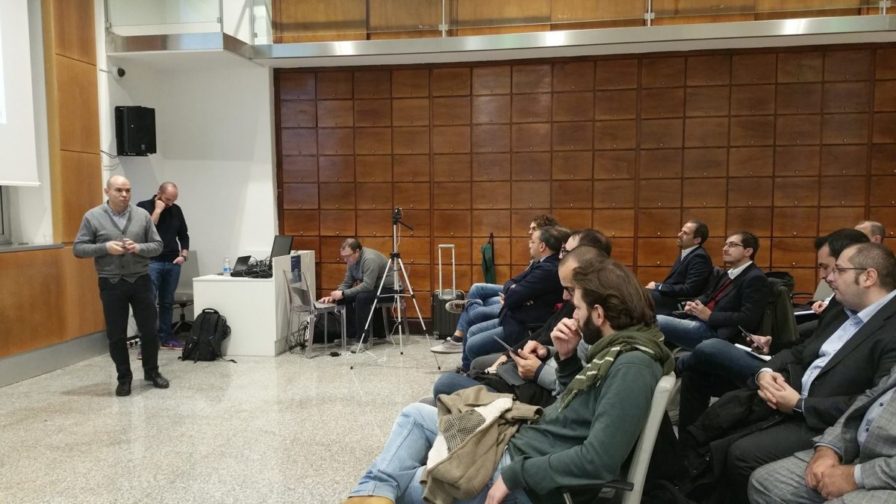
Hello Roberto. Recently you’ve given a presentation entitled “Application Insights: power is nothing without control” for the members of one of the Roman communities. Could you tell us more about it?
I work a lot with Microsoft technologies and I frequently use the Azure resources, where I discovered Application Insights. It’s a product that allows you to insert telemetry quicker within the code in (but not only) .NET, i.e. a set of software that can collect, in real time, information from a web application. For example, it can collect the page that was visited, where it was visited, when it was visited, with what kind of device, how many clicks were made, up to a very high level of detail and not just about the use of the developed application but also for resolving the bugs. This is very important because the software that most companies develop is aimed at creating a product. So if the product performs better, it lets them improve what users request for what are then the market demands.
You said you work a lot with Microsoft technologies and you use frequently the Azure resources. Is this where you got your inspiration from? Did you want to share your discovery with others?
On many occasions, the software‘s implemented, but then it’s not properly traced, embraced or understood and very often I’ve developed web applications where the customer’s never bothered to do an in-depth analysis of how their product was used. This allowed me to share my discovery with more people so they could benefit from it. The various errors I made on the unused software will also happen to many other people.
Who do you think would be most interested in this topic?
It’s certainly of interest to developers who can quickly and effortlessly integrate this service into their code by carrying out a series of activities and getting the Azure platform to collect some important data. Above all, it’s also of interest to the product’s owner, because through analysis of how it’s used they can decide to divert their investments into useful functionalities for the users which might have been underestimated. So it gets two results: the first benefit is from an economic point of view because they invest their money in the right direction and the second benefit that satisfies the “customer”, making its features and services even more attractive and even more saleable to obtain greater profit.
For anyone who doesn’t already know you, could you tell us a few things about yourself?
I’m Roberto Albano and I’ve been a professional developer for about 25 years. Actually, I take care of the whole software development process. During my career path I’ve changed companies a lot. I’ve been very satisfied for a few months now at KPMG, where I work as a Senior Technical Analyst. And out of enthusiasm, since I like coding a lot, I founded a community with friends called dotNET (podcast), whose purpose is to produce mainly audio content, ultimately also video, in which we share our knowledge mainly, but not solely, on the world of Microsoft. Besides that, we’ve been part of Codemotion‘s AperiTech family for some time and we were among the first to start this cycle of meetings, which were very interesting for us because we had the chance to meet people live and in person.
Why did you decide to become a developer?
To be honest, I started doing computer science by chance, because in secondary school I wanted to be a chemist. Luckily, my idea vanished, owing to someone’s advice, as it’s much too complex a world. I decided to follow a friend into doing computer science when I realised I was good enough! It was a real discovery because computing‘s a world that changes every day. I’m a very curious person so I really like to discover how to do new things.
In your free time, are you currently working on any super secret project?
I’m a pretty curious person because I do my job in my free time. I have more than one project on the side and some friends and I are trying to develop the dotNET (podcast) platform. We want to make it international and make content a little freer, not just in the speakers we get but also to make it open to other people. There are still other projects under development, but I’d prefer not to talk about them. What interests me most is continuing to have this passion for my work and the pleasure it gives me.
What is the best way to stay updated with the latest tech news, in your opinion?
It depends a lot on time. I’m happily married and I have a son and a wife that need my time, so I try to dedicate myself to them too. There are certainly more areas to deepen understanding of different topics, but you have to focus on specific topics so you cannot waste your energy on everything. Identifying the topic you like and want to explore further is a bit difficult. The most important thing is to start with curiosity. If you have curiosity, you can certainly attend the technical communities and try to follow the changes that there may be on the inside, as they’re always formed by passionate people who keep themselves constantly updated on the evolution of a specific technology. Of course, the classic method of buying a book and reading it all is something that I’ve done in the past but that I can’t do any longer. Now I collect information from various sites, from various official documents and then I try to be operational as quickly as possible. Of course, this is my way of doing it and everyone has to discover their own way. It also depends on how vertically integrated you are with a technology. I personally, being very curious, have the flaw of rapidly building up new interests. If I study new technologies that I don’t use in my work and discover other ones, I also study those further. It’s also true that if we do this job and we do what we like, then we have a unique opportunity to increase and improve our skills on the job itself.
Final question: what advice would you give to someone who would like to follow the same career path as you?
I recommend this career path to people with plenty of curiosity. I discovered computer science when I was 15 and it immediately seemed so much fun to me that I’ve never moved away from code development. This work always allows you to do and discover new things. It’s all about getting involved in increasingly important challenges. I recommend it to those with a bit of passion for computer science, but especially those with a dose of curiosity and the desire to challenge themselves. Also, I recommend always studying and staying up-to-date because this is a job that evolves day-by-day, so not updating for six months would mean being out of the market.




